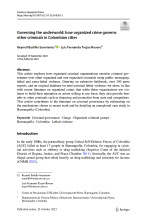By Rivke Jaffe
Rivke Jaffe explains how despite Jamaica’s “dons” are associated with crime and violence, they have become figures of political authority and seen as legitimate leaders.
Throughout Kingston, Jamaica, figures known as “dons” exercise political authority and are seen as legitimate leaders despite their associations with crime and violence. In the absence of strong government support, they provide impoverished residents with access to security, conflict resolution, and various forms of welfare through their own resources and connections to Jamaica’s political parties. In The Rule of Dons, Rivke Jaffe shows how dons’ power relies on a widespread belief in their right to rule, explaining how criminal power is legitimized through a set of aesthetic, affective, and spatial mechanisms. She argues that dons must credibly embody an outlaw persona that stands outside of the political establishment while also connecting strategically to state institutions and mobilizing democratic ideals such as freedom and equality. As such, dons represent a form of authority that involves balancing an autocratic form of rule
with an established democratic order. While donmanship represents a historically and culturally specific type of political authority, Jaffe’s analysis of this phenomenon offers insights into the entanglement of violent autocratic rule and democratic institutions far beyond Jamaica.
Durham, NC: Duke University Press, 2024. 217p.







